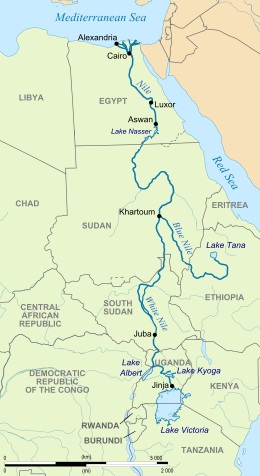Ethiopia has built a huge dam with a capacity of 74 billion cubic meters. This dam lies at the source of the Blue Nile river and is aimed primarily at generating power. For Ethiopia this dam will be a life saver for it will supply electricity to over 86 million Ethiopians who currently live without it.
But there is much controversy over this dam and its effect on riparian counties. The last round of negotiations failed and Egypt’s worries have increased over their water rights, as much of the water that has historically flowed into the Nile Delta will be diverted.
Egyptian journalist and political analyst Mohamad Fawzy says ”Egypt is a country that suffers from scarcity of water and building this dam, the GERD (Grand Ethiopian Renaissance Dam) according to the Ethiopian vision will pose a direct threat to Egypt’s water as allocated in previous agreements and treaties, which gave Egypt 55 billion cubic meters. The crux of the Egyptian stance is that Ethiopian right in development should not happen on behalf of Egypt’s water and national security–human security in general in the Nile Valley”.
Mr. Fawzy goes on to say that the “latest round of negotiations failed when Sudan (a riparian country) offered a suggestion of how negotiations about the dam should be followed. Sudan suggested that a greater role be given to experts in the African Union in an attempt to reach a satisfactory solution to all parties involved. This suggestion was not met with consensus by Egypt or Ethiopia as they saw this issue as matter between the three countries only. Mr. Fawzy goes on and says “In general the last round of negotiations failed as other previous rounds had failed due to the obstinate and uncooperative Ethiopian outlook in regards to the water issue.
Ethiopia tries to pass the matter of the dam strictly as one to do with sustainable development while in reality through the GERD it is engineering for itself a new balance in the area even if this comes at the cost of creating many problems in that region.
Previously when President Nasser was alive relations between Egypt and Ethiopia were much better as Nasser was aware of the vital importance of the Nile Basin and that is why he strengthened ties with the riparian countries. He also greatly supported African independence movements, which further consolidated Egypt’s position in the continent. After the death of Nasser there was negligence of ties with Africa as Egypt sought other ties with the West and America-so previously friendly African countries were left in limbo and that presented Israel with a golden opportunity to step in where Egypt had vacated.
 In 2002 Ethiopia proclaimed that Egypt was a threat to Ethiopia due to the water issue.
In 2002 Ethiopia proclaimed that Egypt was a threat to Ethiopia due to the water issue.
In fact Ethiopia has been prone to Israeli attempts to further instigate problems pertaining to GERD. Netanyahu’s trip in 2016 to the Nile Basin served to further consolidate the gap between the two counties where he received a warm welcome from counties that had previously viewed Israel with distrust.
Mohamed Fawzy says that “Israel does not only offer Ethiopia financial aid but also IT and military equipment. An example of this is when Israel installed an advanced air defense system at the Grand Ethiopian Renaissance Dam”.
So water wars and conflicts continue not only in Africa but also between Turkey and Syria where Turkey cuts off the water of the Euphrates whenever it wants – so depriving Syrians from their water and the right to farm their lands.
Editor In Chief
Reem Haddad

